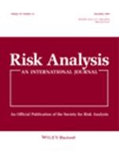
RISK ANALYSIS
metrics 2024
Exploring Innovations in Reliability and Quality
Introduction
RISK ANALYSIS is a premier journal published by Wiley, focusing on the critical intersection of safety, risk, reliability, and quality within the fields of engineering and physiology. With a strong standing reflected in its Q1 category ranking in Safety, Risk, Reliability and Quality and Q2 in Physiology (medical), this journal is a vital resource for researchers, professionals, and students eager to stay informed on the latest methodologies, theories, and applications surrounding risk assessment and management. Since its inception in 1981, RISK ANALYSIS has been instrumental in shaping the discourse in its fields, garnering a robust reputation verified by its high rankings on Scopus, where it is positioned in the 85th percentile in Safety and the 77th percentile in Medicine. Though it does not currently offer Open Access options, the journal remains essential for those committed to advancing their understanding of risks associated with complex systems. For more insights, RISK ANALYSIS is available to readers throughout its converged years extending to 2024, solidifying its role as a foundational journal for impactful research.
Metrics 2024
 0.84
0.84 3.00
3.00 3.50
3.50 153
153Metrics History
Rank 2024
Scopus
IF (Web Of Science)
JCI (Web Of Science)
Quartile History
Similar Journals
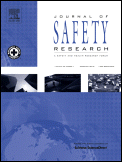
JOURNAL OF SAFETY RESEARCH
Elevating standards in safety, reliability, and quality.The JOURNAL OF SAFETY RESEARCH, published by Pergamon-Elsevier Science Ltd, stands as a premier platform for scholarly discourse within the domain of safety, risk, reliability, and quality. With an esteemed impact factor and a strong ranking of #38 out of 207 in its category as per Scopus, this journal maintains a distinguished Q1 quartile status, reflecting its influence and significance in advancing safety research since its inception in 1969. Researchers, practitioners, and students alike will find a wealth of knowledge here as the journal explores critical aspects of safety in various contexts, highlighting innovative strategies and empirical findings that contribute to improved safety outcomes globally. Though it operates under a traditional access format, the journal’s extensive repository of articles ensures that vital information remains accessible to its readership. The JOURNAL OF SAFETY RESEARCH is not only a cornerstone for those within the safety engineering field, but also a vital resource for professionals seeking to enhance their understanding of risk management and quality assurance methodologies.

JOURNAL OF FOOD PROTECTION
Connecting researchers to the forefront of food protection.JOURNAL OF FOOD PROTECTION is a prominent academic journal published by Elsevier, dedicated to the field of Food Science and Microbiology. With an ISSN of 0362-028X and an E-ISSN of 1944-9097, it serves as a vital resource for researchers, professionals, and students interested in the microbiological aspects of food safety and quality. Since its inception, the journal has evolved significantly, with coverage spanning from 1977 to the present, reflecting its long-standing commitment to advancing knowledge in this critical area. Recognized for its rigorous peer-reviewed research, the journal boasts a commendable impact factor and ranks in the second quartile in Food Science and the third quartile in Microbiology according to 2023 assessments. Its Scopus ranking also highlights its relevance, with significant placements in both Agricultural and Biological Sciences and Immunology and Microbiology. The JOURNAL OF FOOD PROTECTION is an essential platform for disseminating pioneering studies that address contemporary challenges facing the food industry and public health, making it an indispensable resource in the quest for food safety and innovation.
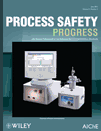
PROCESS SAFETY PROGRESS
Championing research in process safety.PROCESS SAFETY PROGRESS is a distinguished journal published by WILEY, focusing on the critical intersections of chemical engineering and safety, risk, reliability, and quality. Established in 1993, this peer-reviewed journal serves as a significant platform for disseminating high-quality research findings and innovative solutions in process safety. With an established impact within its fields, it holds a Q3 categorization in both Chemical Engineering and Safety, Risk, Reliability and Quality as of 2023. The journal's rigorous manuscript evaluation process, combined with its emphasis on emerging challenges and solutions in industry practices, makes it a crucial resource for researchers, industry professionals, and students alike. Although not Open Access, PROCESS SAFETY PROGRESS continues to enhance its visibility through its indexed presence in Scopus, where it ranks in the 50th percentile in its categories. As it converges to its 2024 volume, the journal remains committed to promoting advancements in the field and fostering a safer environment in chemical process engineering.
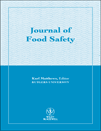
JOURNAL OF FOOD SAFETY
Exploring the forefront of foodborne pathogen research.Journal of Food Safety is a premier resource in the field of food science, offering invaluable insights into food safety practices, microbiology, and parasitology. Published by WILEY, this journal has been a pivotal platform for the dissemination of research since its inception. With an impressive impact factor reflecting its esteemed reputation, the journal caters to a diverse audience of researchers, professionals, and students committed to advancing knowledge in food safety. While currently not an open access journal, it still provides essential findings that contribute significantly to the understanding of foodborne pathogens and preventive measures. Recognized in the Q2 and Q3 quartiles across various relevant disciplines, including Food Science, Microbiology, and Parasitology, the Journal of Food Safety continues to uphold high standards in scientific research and education. Researchers are encouraged to submit their manuscripts and engage with groundbreaking studies that are shaping the future of food safety.
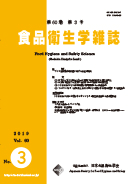
Food Hygiene and Safety Science
Innovating Food Safety for Public HealthFood Hygiene and Safety Science is a pivotal academic journal published in Japan by the esteemed FOOD HYGIENE & SAFETY. With its ISSN 0015-6426, this journal operates within the broad domains of food science, public health, and medicine, strategically addressing the critical issues surrounding food hygiene and safety. With a notable history spanning from 1960 to 2024, it has become an essential resource in these fields, currently holding a Q3 category ranking in Food Science as well as in Medicine (Miscellaneous) and Public Health, Environmental and Occupational Health, according to the 2023 evaluations. Although access options may vary, the journal is committed to disseminating vital research findings to enhance food safety practices on a global scale. With its focus on advancing knowledge and sharing innovative practices, Food Hygiene and Safety Science serves as a vital platform for researchers, professionals, and students dedicated to improving food safety standards and public health outcomes.
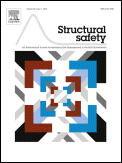
STRUCTURAL SAFETY
Fostering excellence in structural analysis and design.STRUCTURAL SAFETY is a premier journal dedicated to advancing the field of engineering with a focus on safety, risk, reliability, and quality in structural analysis and design. Published by Elsevier, this esteemed journal boasts an impressive Impact Factor and ranks in the top quartiles (Q1) of key categories including Building and Construction, Civil and Structural Engineering, and Safety, Risk, Reliability, and Quality. With a significant history spanning from 1982 to 2024, STRUCTURAL SAFETY fosters scholarly exchange among researchers, professionals, and students by publishing innovative and high-quality research articles that contribute to the safety and resilience of engineered structures. The journal operates without open access barriers, ensuring a broad audience can access invaluable insights in the engineering realm. Its distinguished Scopus rankings further underscore its impactful role within the academic community, making it an essential resource for anyone invested in the discipline of structural safety.
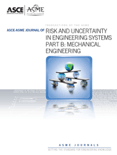
ASCE-ASME Journal of Risk and Uncertainty in Engineering Systems Part B-Mechanical Engineering
Exploring Uncertainty in Mechanical EngineeringASCE-ASME Journal of Risk and Uncertainty in Engineering Systems Part B-Mechanical Engineering, published by the reputable ASME, is a leading platform dedicated to advancing knowledge in the field of mechanical engineering with a particular emphasis on risk assessment and uncertainty analysis. With an ISSN of 2332-9017 and an E-ISSN of 2332-9025, this journal has established itself as a significant contributor to ongoing research in safety, risk, and reliability, consistently ranking in the Q2 quartile for Mechanical Engineering as well as Safety Research categories. As evidenced by its impressive Scopus rankings—including a notable 80th percentile in Safety Research—this journal fosters high-quality research that informs engineering practices and enhances safety protocols. Operating under a traditional access model, it aims to provide researchers, professionals, and students with essential insights and methodologies to address contemporary challenges in engineering systems. Each contribution reflects an aim to bridge theory and application, thus making the journal an invaluable resource for stakeholders striving for excellence in mechanical engineering and safety management.
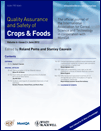
Quality Assurance and Safety of Crops & Foods
Ensuring excellence in crops and food safety.Quality Assurance and Safety of Crops & Foods is a leading peer-reviewed journal, published by CODON PUBLICATIONS, dedicated to advancing the fields of Agronomy and Crop Science and Food Science. Since its inception in 2009, this journal has established itself as a crucial platform for researchers, professionals, and students, focusing on the vital intersection of agricultural safety and food quality. With a commendable impact factor and a current Scopus ranking placing it in the top quartiles of its field (Q2 in 2023), it serves as an essential resource for those committed to ensuring the safety and quality of global food supplies. The journal provides open access options to enhance the dissemination and accessibility of research findings, thus fostering collaborative efforts to tackle contemporary challenges in food production and safety. By showcasing innovative methodologies and cutting-edge research, Quality Assurance and Safety of Crops & Foods not only contributes to scientific discourse but also plays a pivotal role in informing policy and practice in sustainable agricultural practices.

Microbiology Research
Pioneering Discoveries in Microbial ResearchMicrobiology Research, published by MDPI, stands as a pivotal open-access journal in the field of microbiology, having established its presence since 2010. Based in Switzerland, this journal strives to provide a platform for innovative research and cutting-edge findings in various branches of microbiology, including medical microbiology and molecular biology. With an impact factor that reflects its dedication to scholarly excellence, Microbiology Research is classified in the Q3 category for both microbiology and medical microbiology, and Q4 for molecular biology as of 2023, indicating its growing importance and outreach within these domains. The journal aims to foster discussion and collaboration among researchers, professionals, and students by presenting articles that cover a wide array of topics and methodologies in microbiological research. Leveraging its open-access model, Microbiology Research ensures that high-quality research is accessible to a global audience, thus facilitating the advancement of knowledge and innovation in the microbial sciences.
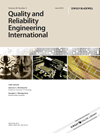
QUALITY AND RELIABILITY ENGINEERING INTERNATIONAL
Transforming Challenges into Reliable SolutionsQUALITY AND RELIABILITY ENGINEERING INTERNATIONAL is a prestigious journal published by WILEY, dedicated to advancing the fields of quality, reliability, and engineering. With an ISSN of 0748-8017 and an E-ISSN of 1099-1638, this journal provides a platform for scholarly articles that delve into the intricacies of management science, operations research, safety, risk, reliability, and quality, as evidenced by its strong ranking in the Q2 category for both Management Science and Operations Research, as well as Safety, Risk, Reliability, and Quality. Established in 1985 and continuing through 2024, the journal has garnered a solid reputation in the academic community, achieving a Scopus ranking in the 70th and 64th percentiles for its respective categories. Although it does not offer open access, its authoritative content is essential for researchers, professionals, and students seeking to deepen their understanding of quality and reliability principles. With its UK-based publishing address ensuring global reach, this journal remains at the forefront of discussions surrounding engineering quality and reliability methodologies.